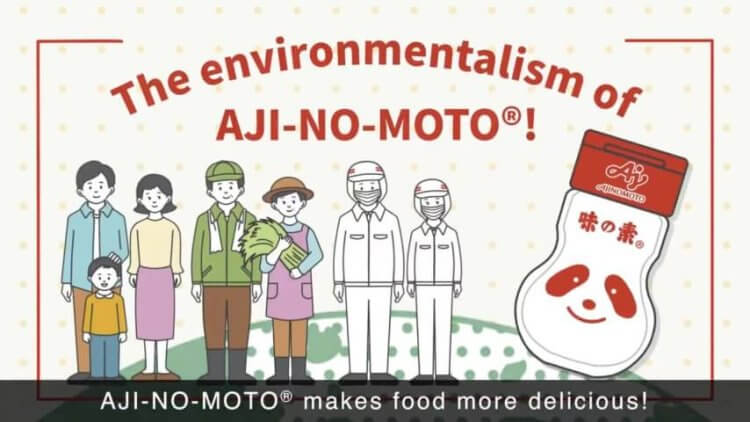Approach to Realizing Our Outcomes
Two outcomes leading to healthier, better living
Our goal as the Ajinomoto Group is contributing to the well-being of all human beings, our society and our planet with “AminoScience.” To this end, we believe it is necessary to achieve two outcomes by 2030: “help extend the healthy life expectancy of 1 billion people” and “reduce our environmental impact by 50%” connected by food systems*1. The business of the Ajinomoto Group is supported by sound food systems; or in other words, stable access to food resources and a verdant natural environment supporting these resources. At the same time, our business operations also have a major impact on the environment. Today, as the planet’s environment is reaching a tipping point, our ability to take action to regenerate the environment is an urgent issue for the continuity of the Group’s business operations. By addressing climate change, ensuring the sustainability of food resources, and conserving biodiversity to reduce our environmental impacts, and by regenerating the planet’s environment through the realization of a circular economy, we can sustainably execute initiatives for healthier, better living aimed at extending healthy life expectancy.
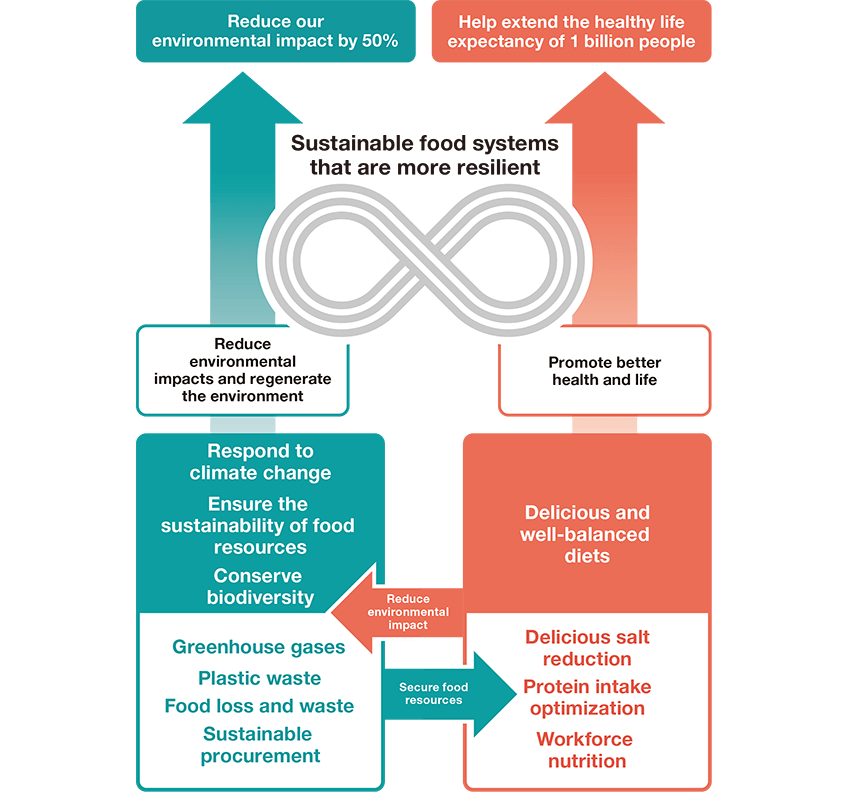
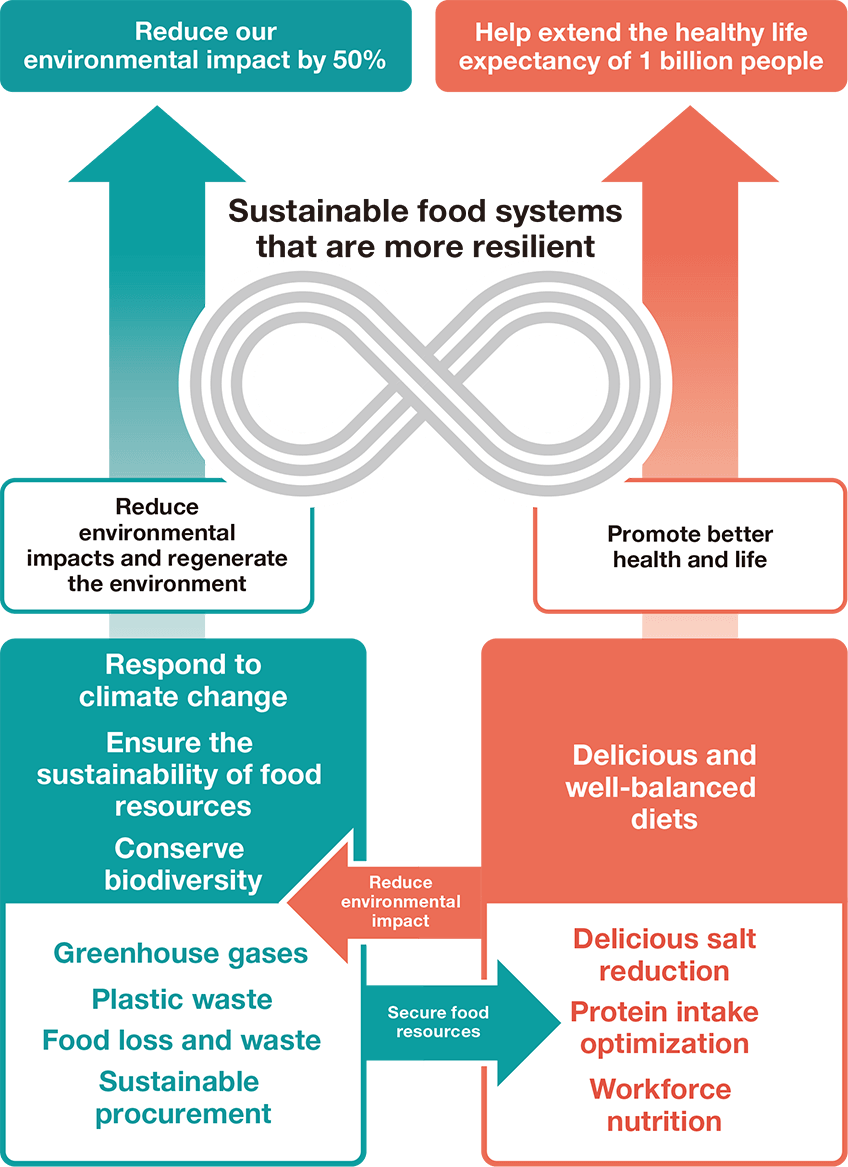
Through our business activities, we provide products and services that are tasty, nutritionally balanced, and of benefit for people’s dietary habits, and that further promote a reduced environmental impact caused by GHGs, plastic waste, and food loss and waste. Also, through our resource recycling-based amino acid fermentation process (a biocycle), we will promote initiatives with a positive impact on natural capital and society and contribute to sustainable food systems that are more resilient and to regeneration of the global environment. Furthermore, we will maximally leverage our strength in “AminoScience,” and transform food systems through innovation and building ecosystems.
*1 Series of processes related to food production, processing, transport, and consumption
Reduce our Environmental Impact
The Ajinomoto Group continues working to achieve the outcome of a 50% reduction of its environmental impact by 2030 and also achieving net zero GHG emissions by 2050. As we head toward 2030, we will carry on with our targets and initiatives covering the key themes of reducing GHGs, plastic waste, and food loss and waste as well as realizing sustainable procurement.
Reduction of GHGs
In fiscal 2022, our Scope 1 and Scope 2 GHG emissions in total has reduced by 19%, and Scope 3 (basic unit) has reduced by 3% compared to the base year of fiscal 2018, accordingly. We commenced discussions with suppliers on reducing Scope 3 emissions beginning with MSG raw materials in Thailand.
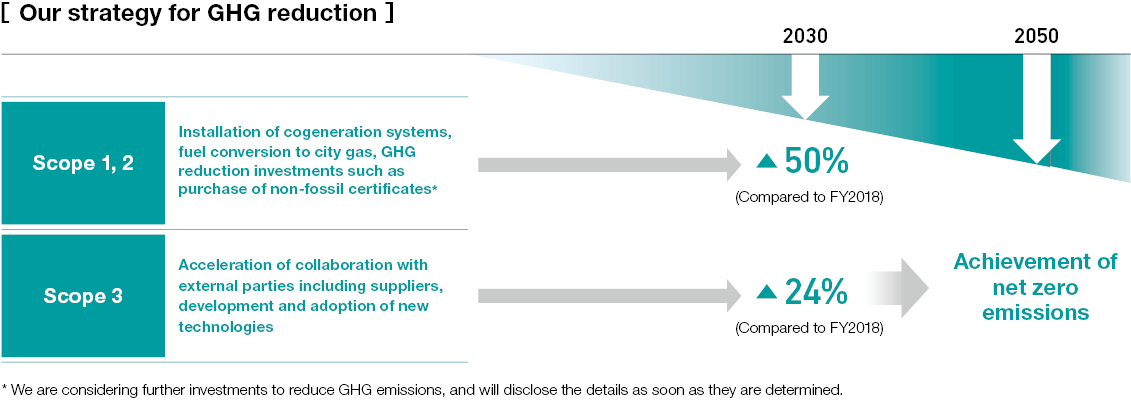
Focus on the biocycle for amino acid fermentation
The Ajinomoto Group is building a proprietary biocycle for amino acid fermentation that spans the globe from Thailand, Vietnam, and Indonesia to Brazil. We produce amino acids using fermentation methods fed by agricultural produce easily accessible in each country and region as the main ingredient. At the same time, nearly 100% of the highly nutritious co-products after amino acid extraction are utilized in fertilizers and feed. We refer to this cyclical amino acid fermentation process as a biocycle. This approach allows us to reduce GHG emissions associated with the production of traditional chemical fertilizers and support sustainable agriculture.


The Ajinomoto Group will transition all plastics that it uses to recyclable materials after carefully selecting plastics in the minimum amount and use required for product safety and quality by 2030. At the same time, we also support the establishment of recycling systems in each country and region. The amount of plastic used in fiscal 2022 was 69,000 tons, of which 48%*1 was suitable for recycling. We reduced the amount used by approximately 800 t/year by using thinner packaging materials, and changed roughly 900 t/year of the packaging design to make it easier to recycle. In addition, efforts to collect waste have begun in Indonesia and other countries.
*1 We have revised the definition of recyclable packaging materials.

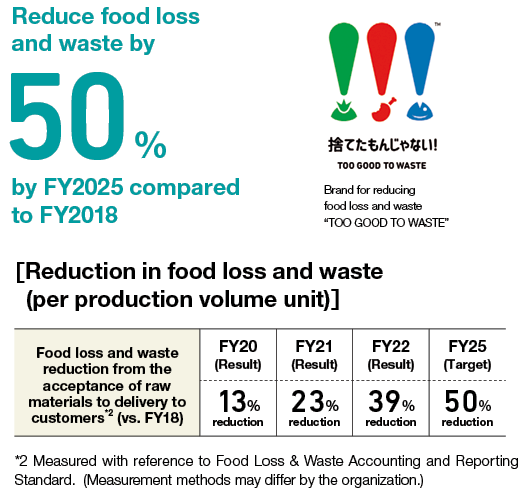
The Ajinomoto Group has established a target to halve food loss and waste generating from the acceptance of raw materials to delivery of products to the customer by fiscal 2025 compared to fiscal 2018. As the efforts on reducing generation and promoting utilization of food loss and waste as feed and fertilizer have made much progress, we expect to achieve this target by fiscal 2025. Our long-term vision is to halve food loss and waste occurring throughout the entire product life cycle by 2050. In 2022, we created the brand “TOO GOOD TO WASTE” to help promote our food loss and waste initiatives. We intend to further promote efforts across our entire food supply chain.

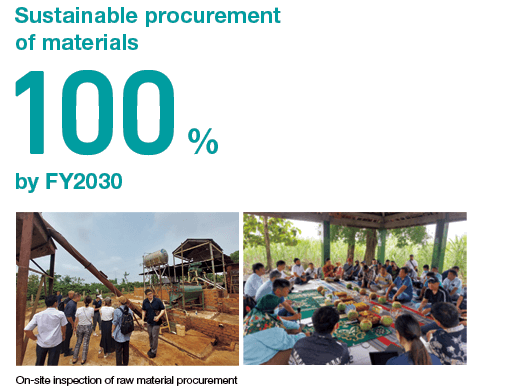
We are visualizing issues in the supply chain, conducting human rights impact assessments, and promoting animal welfare in order to build a responsible supply chain. Additionally, we aim to source 100% of our primary raw materials, including palm oil, paper, soybeans, coffee beans, beef, and sugar cane, from sustainable sources by fiscal 2030. Toward this end, we are working to ascertain the current procurement situation as well as establish traceability systems and promote procurement of products certified as sustainable. In fiscal 2022, we procured 99% of palm oil and 98% of paper from sustainable sources.
Help Extend the Healthy Life Expectancy
Four commitments for Nutrition Without Compromise
The Ajinomoto Group is committed to help extend the healthy life expectancy of one billion people using its approach of “Nutrition Without Compromise.” This entails proposing and providing nutritionally balanced meals by promoting low salt, sugar, fat solutions, along with appropriate intake of protein, vegetables, and fruits, without compromising taste, access, and the local way of life that the Ajinomoto Group emphasizes. Through our Commitment to Nutrition announced in fiscal 2021, our specific targets involve increasing opportunities to supply products with improved nutritional value and increasing the nutritional literacy of employees as our closest stakeholder in an effort to have positive impacts.
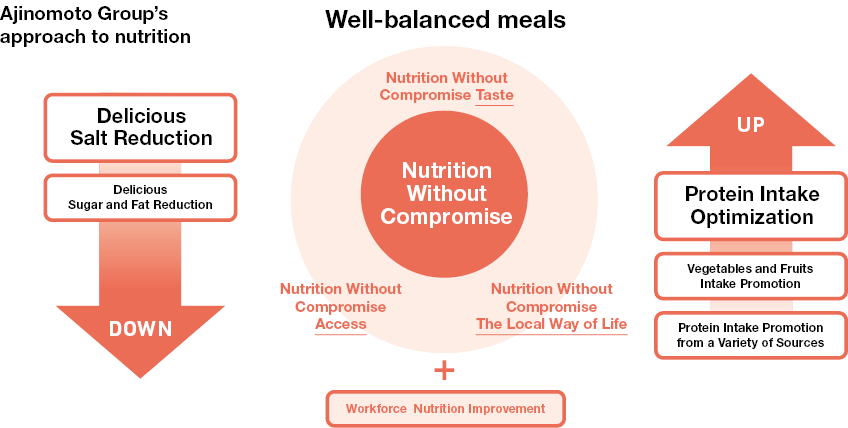
Nutrition Commitment 1: Delicious salt reduction
Quantification of salt reduction effect by umami
In fiscal 2022, we implemented salt reduction initiatives using umami together with 12 local governments in Japan and in 10 countries worldwide. Also, through the U20 Healthy Umami Research Project, we attempted the quantification of salt reduction effects of umami through tie-ups with academia, and released papers on the results.
Nutrition Commitment 2: Provide nutritious products
Nutrient profiling in 13 countries
In 2020, we commenced operations of the Ajinomoto Group Nutrient Profiling System, called ANPS-Product. As of March 2023, this system has been introduced at 16 of our subsidiaries across 13 countries and used to evaluate over 800 products. We are also promoting product development geared toward wellness using “AminoScience.”
Nutrition Commitment 3: Provide information, recipes, and menus
Disseminating information through the internet
We are looking to provide consumers with recipes and information on delicious salt reduction sourced from owned media on social media so that more people can eat healthy. We are also strengthening information dissemination, such as collaboration with influencers.
Nutrition Commitment 4: Workforce nutrition improvement
Improving employee nutritional literacy
The Ajinomoto Group is focusing on workforce nutrition improvement as a part of ASV management, particularly by increasing nutritional literacy among employees. From fiscal 2020 to fiscal 2022, we provided nutrition education to a total of 56,000 employees.
Roadmap to one billion people
The Ajinomoto Group is promoting initiatives for nutrition improvement aimed at realizing the outcome “Help extend the healthy life expectancy of one billion people” by 2030. In fiscal 2022, the total number of people we provide with products that contribute to improving nutrition reached 0.54 billion for umami seasonings and 0.34 billion for salt reduction products or products useful for protein intake, for a total of 0.88 billion. As for umami seasonings, we are promoting activities for delicious salt reduction using umami in countries around the world as well as evolving and expanding our contact points from deliciousness to include deliciousness and wellness. We have commenced a review on how to broaden our reach in terms of “contributing to the well-being of all human beings, our society and our planet with ‘AminoScience’.”, in addition to helping to extend the healthy life expectancy of one billion people and reducing our environmental impact by 50%.

